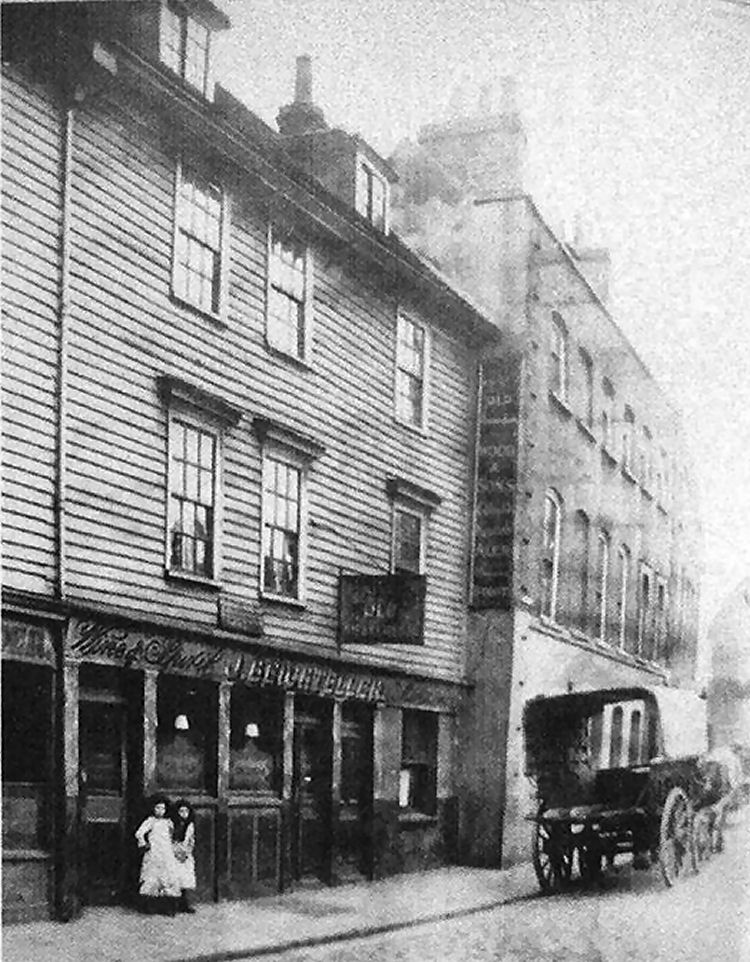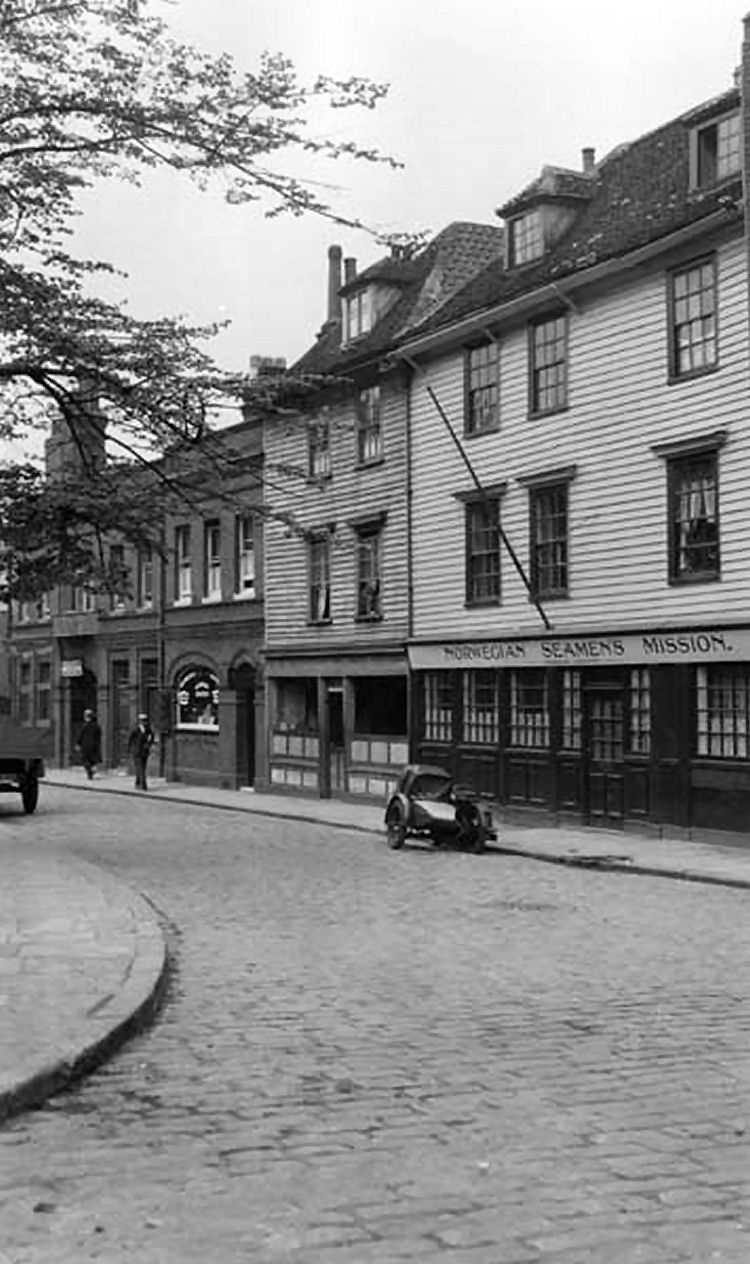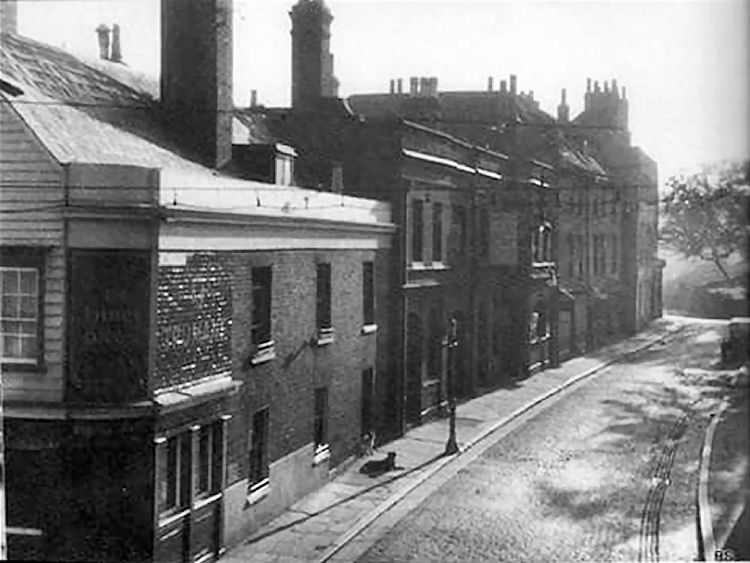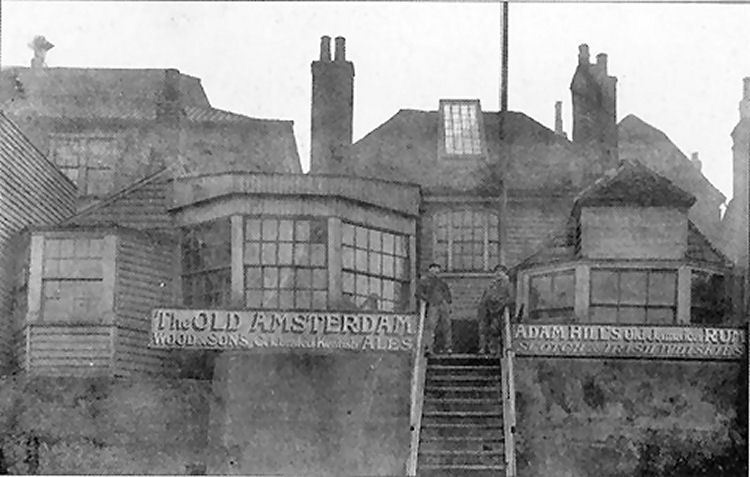|
6 East Street
Milton
Gravesend

Above photo, circa 1900, kindly sent by John Hopperton. |

Above photo, circa 1913. |

"Old Amsterdam" circa 1900. |

Above photo showing the "Three Daws," "Falcon Hotel,"
"King of Prussia,"
and "Old Amsterdam." 4 in a row. |

Above photo date unknown. |
Information collected from "Gazetteer of Gravesend and Milton Inns and
Public Houses" by E. R. Green. May 2000. Also from Brian Brockie (2017).
Mentioned in Victuallers Recognizances and Milton Parish Registers and often referred to as simply the "Amsterdam," and later the "Old
Amsterdam."
The pub may date from the 16th Century and had a reputation connected to
smuggling. (M.P. Reg. June, 1620.) This inn had a very long causeway or
bridge.
It was adjacent to the "White Hart,"
the "Green Dragon" and the "Boot."
These pubs were owned by a David Varchell. The original building was destroyed in the Great Fire of Gravesend August
1727 but rebuilt in 1730 and again in 1783.
The new pubs were the "Pelican
and Roebuck" and the "Amsterdam" were rebuilt.
Another fire damaged the building in March, 1888.
It catered to ‘the better class of sailor’. It closed in 1915 but
understand the building was taken over by a Norwegian seaman's mission
around 1930 and was used by the National Sailors and Firemen’s Union, by the
Scandinavian Sailors Homes and then by a car hire firm. The Council bought
the freehold from the Church Commissioners and finally demolished it in
January, 1954. It is now (2000) on the site of St. Andrew's Gardens.
|
Milton next Gravesend Burials from the register of St Peter & St Paul.
22 Jun 1620. ____ Evans, a Souldier that died at the Amsterdam.
15 Feb 1623/4. John ____ Tapster at the Amsterdam.
26 Oct 1623. John W__d*, Victualler at the Amsterdam.
5 Apr 1625. John Crosse, a stranger that died at ye Amsterdam.
21 Oct 1625. Robert Bassana, a Leiftenant of the low countreys who
died at ye Amsterdam.
28 Oct 1628. John Talbott, a stranger who died at ye Amsterdam.
3 Aug 1667. A Seaman from the Amsterdam.
|
|
Southeastern Gazette, 10 May 1853.
Friday. Before J. Saddingion, Esq., Mayor, R, Oakes, C. Spencer, and
E. Tickner, Esqrs.)
John Brady Jessup, of the "Amsterdam," was
similarly, charged, (for keeping his house open on Sunday
morning) and the case was proved by White, who saw three men in
this house and some drink before one of them.
Fined 7s., costs 7s. 6d.
|
|
Kentish Independent, Saturday 14 May 1853.
John Bradley Jessop, landlord of the "Amsterdam," was charged for a
similar offence, that for having his house open for the sale of liquor
on Sunday morning.
Police Constable White stated, that on Sunday morning at about 10
minutes past 11 o'clock, he saw a man with a child let into the house,
witness followed on towards the back room, and there saw two other men,
and a pot with beer on the table, the two men were known to witness, but
not as travellers.
The defendant admitted the bear being on the table, but denied that the
two men belonging to the town had had any beer.
The Bench inflicted the following penalty, Mr. Jessop 7s. and cost 7s.
6d.
The Bench in reply to a question from one of the publicans present said
that they did not consider persons coming from London on pleasure by the
steamboat's were "travellers," such as a law contemplated in the
exceptions.
|
|
Kentish Independent, Saturday 27 August 1853.
John Bradley Jessica landlord of the "Amsterdam," East Street was
charged with not admitting into his house at police constable, on the
request being made. The defendant requested that the witnesses might
leave the court, which was ordered.
Police cancel Andrews stated that shortly after 1 o'clock on a Sunday
morning, he was passing the "Amsterdam;" it was apparently closed, but
witness heard voices inside; he heard one person distinctly ask for a
pint of beer and he heard the working of the machines, witness knocked
again, and he then heard the footsteps as of two persons stealthily
moving along the passage; after knocking the third time Mr. Jessup
opened the door; it was full five minutes from the time he knocked.
To defendant:- When he came to the door, you said you had been in the
cellar.
Police constable Easterby stated that shortly before 1 o'clock he heard
voices within the house; he then passed away, but meeting Andrews he
mentioned it to him, and they went back to the house; they then heard
voices evidently of person's wrangling, and after that the footsteps of
two persons coming as it were towards the bar, and someone asked for a
pint of beer, then heard the working of the engine; witness then said
"now's your time," and Andrews knocked at the door; it was not answered,
and they heard the noise of footsteps stealthily going towards the back
of the house where there is an egress by the water; after knocking
several times, Mr. Jessup opened the door, and he then denied that
anyone has been in the house; it was nearly 10 minutes before the door
was opened.
To defendant:- I told you I was satisfied that gambling had been going
on from the discourse which I heard; you denied it and said there had
been no cards in the house for above a week, he asked us to go through
and look, but it was no use then as the parties had left by the back.
Mr. Jessup, in reply to the charge, said that the parties at the bar
were lodges in the house, and that he was in the cellar when the
officers knocked; his sister was at the bar and she not being able to
reach the top bolt of the door called him up, he came up and opened the
door as quickly as he could, and it was in less than 3 minutes; and he
then asked the officers to go into the house, and see if any persons
were their.
The bench told Mr. Jessup that the whole course which he had pursued
have been a very unwise one; for when he was present on Wednesday, if he
had not then stated that the constable swore falsely, he would in all
probability simply have been cautioned; but when a respectable man was
told that he had sworn falsely, it was due to that person that the
investigation should be carried further; either from clearing himself
from the charge, or if unable he would certainly be unfit to continue a
constable; the bench believe the constable had spoken truly and every
respect, and he had also been confirmed by the evidence of another
constable, who upon the defendant's own request had been absent from the
court during the time that Andrews was giving his evidence.
The bench fined the defendant 7s. and 9s. 6d. costs.
|
|
Loosely translated from Norwegian.
https://www.sjomannskirken.no. Accessed August 2015.
The “Old Amsterdam” Gravesend
“The Old Amsterdam” was built in the 17th century with the function of a
restaurant, party house and for lodging and had a rather bad reputation.
When the current owner died in 1701 he gave the building to charity: 100
poor Gravesend boys were given new socks and shoes from the income made from
“The Old Amsterdam” (Bud and Hilsen, July 1930).
There was a lot of “dirt and rags and wretchedness” that had to be taken
care of, but “The Old Amsterdam” was completely altered, and soon sailors
from the tankers had a nice and welcoming place to meet, with a library, a
celebration hall and a chapel.
In Bud and Hilsen's April edition in 1929, this was typed in the “Latest
News” section:
“Sometime in the near future there will be established a trial enterprise at
the different loading areas by the River Thames, with Gravesend as the
centre. The aim is to reach as many boats as possible, especially those
which unload from Erith to Gravesend, and the big boats which unload by the
oil refinery in Thameshaven, Shellhaven and Cory's Wharf. The last ones are
normally from the Black Sea, spend ca, three weeks at sea, and unload their
boats at a harbour far away from people. For safety reasons flames are not
permitted on board, smoking is strictly forbidden, and the food is cooked on
land. This trial enterprise, which is said to bring many difficulties, will
be led by assistant Markmanrud.”
A wing of a building was rented at the old "Clarendon Hotel" in Royal Pier
Road, right by the riverside. After a hectic remodelling job, assistant Thorlief Markman and his wife could on the 12th of May 1929 have an opening
party for the reading room in Gravesend.
After a short while the leasing contract was terminated. For a long while it
looked like the activity at Gravesend would have to stop, as new premises
were hard to find. In the end the old, infamous pub “The Old Amsterdam”
became a solution.
As in so many places, the shipping structure altered in time, and after a
while most of the ships came to the other side of the River Thames. Established in 1929 as a subsidiary to London. It was moved to
Stanford-Le-Hope in 1937.
|
|
Gravesend Reporter, North Kent and South Essex Advertiser 02 January 1869.
To The WORKING CLASSES.
A Large and influential Meeting was held at the "Amsterdam,"
East-street, Gravesend, on Friday December 4th, 1868, for the purpose of
Forming a Co-Operative Society.
For the benefit of the Working Classes, and a large number of Members
enrolled.
A Call of Five Shillings was made on each Share, payable on or before
the 1st day of January, 1869.
The Meeting Nights will be held on every Friday Evening at 8 o'clock.
All information can be obtained by applying at the "Amsterdam,"
East-street, Gravesend.
|
|
London Evening Standard 04 August 1884.
COLLISION IN THE THAMES. LOSS OF A STEAMER AND SEVENTEEN LIVES.
A Correspondent telegraphs from Gravesend:— Shortly after midnight on
Saturday the steam Ship Dione, of Stockton, Captain Hood, master, on her
way down the river, bound for Middlesbrough, was in collision near the
Oven's Buoy with another steamer, supposed to be the Camden, of London,
on her way up the river from Falmouth, in tow of two tugs. The Dione
sank in two or three minutes after being struck. Ten of her crew and
seven passengers are reported to be missing. The Captain—who received
some injuries in the head from falling wreckage—with nine of the crew
and seven passengers were saved by various boats and landed at
Gravesend. A preliminary inquiry has been commenced by the Board of
Trade, Mr. J. M. Newman, one of the Receivers of Wrecks, resident in the
town, having taken the depositions of some of the survivors. The Master
is reported by his medical attendant to be quite unfit to make any
statement at present, his injuries being of a serious character. The
list of saved includes the first and second officers, Charles Jordan and
George Driver; Mr. William Dives, a saloon passenger, Stockton-on-Tees,
who has lost his wife, Eliza, aged 30, and infant daughter, Ethel, aged
three months, and is himself badly injured; a fore-cabin passenger
named James Watson, of Ratcliff, and his wife,
named James Watson, of Ratcliff, and his wife, Harriet Ann, his
daughter, aged eleven years, being missing. In both instances the
children were struck out of the arms of their parents by the falling
wreckage.
Mr. Dives, a passenger on board the Dione, in giving a narrative of the
sad occurrence, said:—
For some time I have been School Board officer at Stockton. A week ago I
went on a holiday, with my wife and two children—a boy, three years of
age, and a baby, three months old. Our destination at that time was
Portsmouth; and having spent our time pleasantly we took train to
London, and embarked on board the Dione, at Fret Trade Wharf, for
Stockton. All went well until the fatality which took place bereft me of
my wife and child, my little boy being saved. The pilot boat left us off Gravesend Pier, and we
proceeded steadily. The place at which we
struck was about two and a half miles from the pier, directly in
mid-channel. Ten minutes before the collision I was on deck, my wife and
children being below. The night was clear, and, as far as I remember,
our proper lights were burning. At twenty minutes after twelve I was
talking to my wife, the children having gone to rest. I had scarcely
undressed, and was closing the scuttles to prevent the water coming in.
A sound something like a heavy scraping followed, which I for a moment
imagined was caused by our running aground. I did not feel particularly
alarmed, but nevertheless ran up on deck. Even in that short time the
water was level with the deck, and I at once shouted to my wife, “Eliza, make haste, were going down.” I seized her by the arm, and also
my boy, my wife holding the baby close to her. The next second we were
in the water. Being an excellent swimmer I believed that I could save
them. Scarcely had I struck out, however, before a spar cut me over the
eye. I let go my grasp for a moment, and they were swept from me. The
vessel which struck us was piloted by two tugs, and they rendered all
the assistance in their power. I was picked up by one of the tugs, and
was overjoyed to see my little
son, who was seized while floating on the hatch of the Dione, but how he
got there it is impossible for me to say; his escape was marvellous.
In less than two minutes the whole thing was over. There were simply one
or two shrieks from the women, and down she went; the next moment all
was as silent as death.
One of the crew of the ill-fated vessel, who
declined to give his name, has stated that the Dione carried a valuable
cargo, including brandy, oils, &c., and was bound for Stockton. There
were 37 persons on board, 20 of the crew and 17 passengers, including
children. Ten of the crew were lost and seven of the passengers.
Directly the Dione was struck she began to fill, and the persons who
perished were all below. He believed the two engineers were drowned, as
it was almost impossible for them to have come on deck. An attempt was
immediately made to lower a boat, and to get at the life belts, but
there was not the slightest chance to do either. He saw Captain Hood, of
the Dione, swimming, and when the captain was rescued he was bleeding
profusely from wounds on his head and body. After steaming about in the
hope that others might be saved, the survivors were conveyed by the tug
to Gravesend Town Pier, where they landed, and were lodged at the "Old
Amsterdam Tavern," East-street, Gravesend. The appearance of the
unfortunate people the narrator described as heartrending. They were all
more or less bleeding from wounds, dripping wet, and lamenting the loss
of friends or relatives. The treatment they received at the hands of the
landlord was most humane. They were immediately put to bed, fires
lighted in their rooms, and clothing provided for them, as well as other comforts. The only lady passenger saved was among them
and in addition to the distress she experienced in the loss of a
daughter, about twelve years of age, she had two of her toes smashed and
was severely injured in one of her legs. The captain, too, was somewhat
delirious, and a medical gentleman who was called to attend him left
orders for him to remain at the house.
Yesterday morning the bodies of two little girls, one about twelve and
the other younger, were picked up off Thames Haven, and conveyed to the
mortuary for identification.
|
LICENSEE LIST
W--D John to 26/Oct/1623 dec'd
LITTLE Joseph 1824-28+

MARTIN George 1832-41+ (age 42 in 1841 ) )
 
JESSUP John Bradley 1853-55+
ALLEN William 1858+
DeWARDT John 1861-Apr/69 (also Seaman Boarding House age 41 in 1861 ) )
WALTER Thomas J Apr/1869+
WALTER Sarah 1871+ (widow age 42 in 1871 ) )
BEADLE Thomas 1874-78+
WINDSOR Charles Thomas Mar/1879+

WINSER Ann 1881+ (widow age 54 in 1881 ) )
DEAN William Holland 1882+
MASTIN Henry 1891+
BIECHTELLER Jacob 1894-1910 (age 49 in 1901 ) )

RICHBELL William George 1913+
http://www.pubshistory/OldAmsterdam.shtml
 From the Pigot's Directory 1828-29 From the Pigot's Directory 1828-29
 From the Pigot's Directory 1832-33-34 From the Pigot's Directory 1832-33-34
 Census Census
 Gravesend Reporter Gravesend Reporter
 From the Kelly's Directory 1903 From the Kelly's Directory 1903
|




